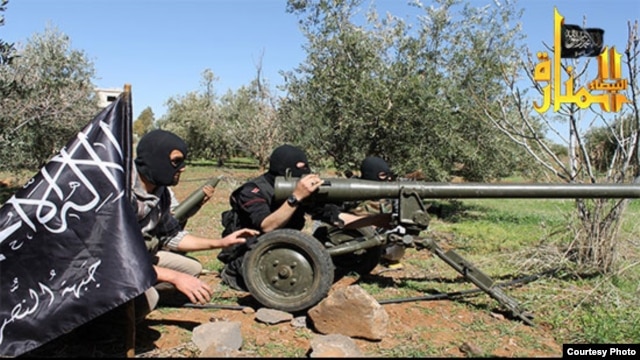| Nasrallah, the leader of Hezbolla |
1 Why do the heathen rage, and the people imagine a vain thing?
2 The kings of the earth set themselves, and the rulers take counsel together, against the LORD, and against his anointed, saying,
3 Let us break their bands asunder, and cast away their cords from us.
4 He that sitteth in the heavens shall laugh: the Lord shall have them in derision.
5 Then shall he speak unto them in his wrath, and vex them in his sore displeasure.
6 Yet have I set my king upon my holy hill of Zion.
Iran and Hezbollah have effectively taken over Syria,
guiding the nation's military operations and functions of government.
In short, some Middle East analysts believe Syria no longer exists.
The government of Syria and the running of the Syrian military are no longer are under the command of the Syrians.
Lebanon also is no more, like Syria, it's now in the sphere of Iran and Hezbollah who run everything now.
In short, some Middle East analysts believe Syria no longer exists.
The government of Syria and the running of the Syrian military are no longer are under the command of the Syrians.
Lebanon also is no more, like Syria, it's now in the sphere of Iran and Hezbollah who run everything now.
 |
| Syrian rebels, equipped with western weapons, fly the flag of Al Qaeda |
Rebel ranks have been infiltrated by Sunni al-Qaida (AQ) linked militants, including the al-Nusra Front, which is affiliated with a similar group from Lebanon called Ansar Bayt al-Maqdis.
Because of direct Hezbollah involvement in fighting against anti-Syrian government fighters, militants have threatened to attack Hezbollah strongholds in Lebanon, a prospect that could quickly spread the sectarian Sunni-Shia fighting inside Lebanon.
Pitched battles already are taking place in the northern Lebanese city of Tripoli, a Sunni stronghold. Sunni opposition forces have been engaging Hezbollah fighters who have aligned themselves with Shiites and Shiite Alawites in the region.
Syrian opposition positions near Tripoli and the immediate area recently were bombed by Syrian government forces. The area is one of the main avenues for infiltration of arms and foreign opposition fighters into Syria. The other conduit is Turkey.
If Syrian opposition forces attempted to invade Lebanon, they would need to go through the Beqaa Valley, which is under Hezbollah's control. The area is a virtual armed camp, which has been a deterrent from the chaos in Syria.
Hezbollah has moved a 50,000-strong force into Syria to fight alongside Syrian government troops. Sources say there are plans to increase that number to some 100,000 Hezbollah fighters.
The Hezbollah guys are here (in Damascus), not near Maroun el Ras, a source said, referring to the influx of Hezbollah fighters into Syria.
Maroun el Ras is a Lebanese village in southern Lebanon about a kilometer from the border with northern Israel. In the 2006 war between Hezbollah and Israel, Maroun el Ras, which is at an elevation of almost 3,000 feet and overlooks Israeli villages, was a strategic focal point.
It was the scene of a major confrontation between the two in which the village's occupation changed hands during the 34-day conflict. However, Israeli forces never fully occupied the village which ultimately remained in the hands of Hezbollah.
Shiite Iran and its Lebanese proxy, Hezbollah, openly are backing the the embattled regime of Syrian President Bashar al-Assad, who is a Shiite Alawite, fighting a religious civil war against Sunni opposition fighters, most of whom are foreigners financed and primarily armed by Sunni Qatar and Saudi Arabia.
The CIA is assisting in funneling Qatari and Saudi arms into Syria.
General Qassem Suleimani is pictured above.
In addition, the Iranian Revolutionary Guard Corps' elite Quds Force also is advising Syrian commanders, a development which sources say is under the command of Qassem Suleimani, who is overseeing operations out of the Syrian capital, Damascus.
The reason for direct Iranian and Hezbollah involvement is not only to assist in the fighting but to maintain control over Syria should the government of Assad fall.
Hezbollah also is reportedly training fighting forces which would come under Iran's control should Assad fall from power.
Iran and Hezbollah are undertaking this direct involvement because of the geostrategic significance of Syria.
With Syria, Iran has extended its influence from the Middle East to Central Asia. Syria also is a conduit to transfer weapons to Hezbollah in Lebanon.
Hezbollah involvement in Syria became apparent last October when Hezbollah Secretary-General Sayyed Hasan Nasrallah denied the involvement of the resistance movement in Syria. Nasrallah said at the time, "we have not fought alongside the (Assad) regime. We don't know about the future."
In addition, the Iranian Revolutionary Guard Corps' elite Quds Force also is advising Syrian commanders, a development which sources say is under the command of Qassem Suleimani, who is overseeing operations out of the Syrian capital, Damascus.
The reason for direct Iranian and Hezbollah involvement is not only to assist in the fighting but to maintain control over Syria should the government of Assad fall.
Hezbollah also is reportedly training fighting forces which would come under Iran's control should Assad fall from power.
Iran and Hezbollah are undertaking this direct involvement because of the geostrategic significance of Syria.
With Syria, Iran has extended its influence from the Middle East to Central Asia. Syria also is a conduit to transfer weapons to Hezbollah in Lebanon.
Hezbollah involvement in Syria became apparent last October when Hezbollah Secretary-General Sayyed Hasan Nasrallah denied the involvement of the resistance movement in Syria. Nasrallah said at the time, "we have not fought alongside the (Assad) regime. We don't know about the future."


No comments:
Post a Comment